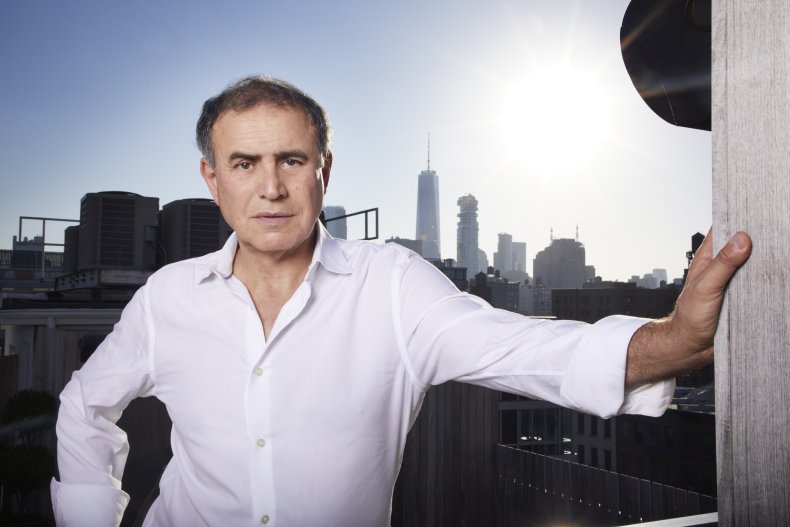ON 10/13/22
Nouriel Roubini, a former senior adviser to Obama's Treasury Secretary, said the global economy is on track to a "slow-motion train wreck," in an interview with Newsweek.
"We're seeing a situation in which short term trends are consistent with my medium-, long-term story where there is mounting economic, monetary, social, political, geopolitical, environmental and technological threats and they're building up," Roubini, who earned the nickname "Dr. Doom" for predicting the 2008 financial crisis, said.

In his latest book MegaThreats: Ten Dangerous Trends That Imperil Our Future, And How to Survive Them, Roubini outlines ten threats catapulting the world towards unprecedented economic catastrophe. Among the threats is what he predicts to be "the mother of all debt crises," which he says will come sometime in the current or next decade.

"We're seeing a situation in which short term trends are consistent with my medium-, long-term story where there is mounting economic, monetary, social, political, geopolitical, environmental and technological threats and they're building up," Roubini, who earned the nickname "Dr. Doom" for predicting the 2008 financial crisis, said.

In his latest book MegaThreats: Ten Dangerous Trends That Imperil Our Future, And How to Survive Them, Roubini outlines ten threats catapulting the world towards unprecedented economic catastrophe. Among the threats is what he predicts to be "the mother of all debt crises," which he says will come sometime in the current or next decade.

Nouriel Roubini, former senior adviser to President Obama's treasury secretary and former senior economist for President Clinton's Council of Economic Advisers. "The trend is not going in the right direction," Roubini told Newsweek.
Over the last couple of years, the economy has taken several devastating blows as a result of the pandemic and Russia's invasion of Ukraine. Skyrocketing inflation and rising prices at gas pumps and grocery stores have forced many Americans to tighten their belts and head to the polls this November with the economy at top of their minds, numerous polls show.
Another bad sign came on Thursday in the form of September's inflation report, which showed consumer prices climbing far more quickly than expected, with the Consumer Price Index rising to 8.2 percent, and overall inflation climbing another 0.4 percent, much higher than last month's 0.1 percent.
"Economic and financial damage is happening here now," Roubini said.
Roubini said that while much of the underlying economic problems have been in slow-motion for some time now, the "geopolitical depression" that the world is in—with the war in Ukraine, the OPEC's oil production cut, tensions between Beijing and Taiwan, recent missile launches from North Korea and the election of far-right Giorgia Meloni in Italy, among other events—has put us on a "collision course that is accelerating."

On Monday, Russian President Vladimir Putin's mass strikes across Ukraine prompted Western allies readied to further economic sanctions against Moscow. Although Roubini thinks the sanctions are needed, he said it is "likely" that the U.S. and Europe will end up in a recession by next year.
"A hard landing is more likely than a soft landing," he told Newsweek.
The Biden administration has repeatedly reassured the American public that a recession does not lie ahead, and just Tuesday, the president himself said that even if there were one, it would be a "very slight" economic dip.
"Every six months they say this. Every six months, they look down the next six months and say what's going to happen," Biden told CNN's Jake Tapper. "It hadn't happened yet. It hadn't...I don't think there will be a recession. If it is, it'll be a very slight recession."
But Roubini fears that what looms ahead will be much worse than slight.
"The dystopian scenario, to me, looks more likely, so far, than the more utopian one," he said. "The trend is not going in the right direction."
In his book, Roubini also argues that there is also a "demographic time bomb" when it comes to providing financial safety nets for aging workers.
"Not enough money exists to deliver on the financial promises that have been made to workers and the swelling numbers of retired workers in advanced economies," he writes. And so, "Instead of buying goods and building nest eggs for young families, the paycheck of active workers will be more and more devoted to maintaining safety nets for the elderly."

On Thursday, Social Security announced an 8.7 percent cost of living adjustment for retirees—the highest inflation increase to benefits in 40 years. At the time of last year's 5.9 percent increase, the bump had been the largest adjustment seen in four decades.
Beginning in January, the average Social Security retiree benefit will increase $146 a month, then $1.827 in 2023 and $1,681 in 2022.
"Younger generations are already worried—even before they retire—about whether their income and wealth is going to be as good or better than their own parents," Roubini said. With a number of unexpected setbacks like COVID, "their job opportunities, income and wealth are already challenged, let alone the fact that the Social Security Trust Fund is going to be run down in two years."
"By the time Millennials or Gen X or Gen Z are gonna retire, we know that they're gonna receive only a fraction—80 percent, 70 percent, 60 percent—of what their expected benefits are," he added. "But they're already having trouble today, let alone 30, 40, 50 years from now."
"MegaThreats" is set to publish October 18.
No comments:
Post a Comment